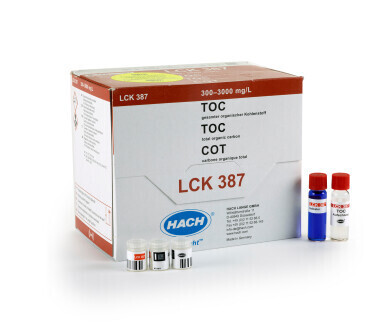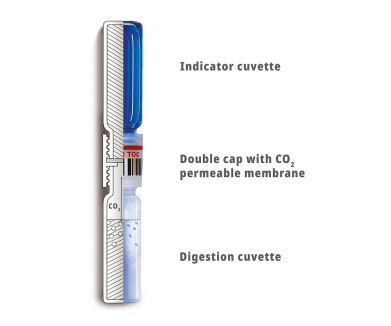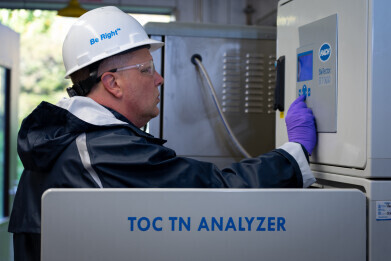-
 One of five available LCK TOC Cuvette Tests
One of five available LCK TOC Cuvette Tests -
 Principle of the LCK TOC Cuvette Test
Principle of the LCK TOC Cuvette Test -
 A BioTector B7000 TOC TN analyser during maintenance which in most applications is done 2x per year
A BioTector B7000 TOC TN analyser during maintenance which in most applications is done 2x per year
Water/Wastewater
COD or TOC… which is the best measure of water contamination?
Apr 09 2024
COD remains one of the most important measures of pollution in water, with simple, reliable analysis via cuvette test photometry. Conveniently, Hach’s photometric LCK system can also be used to determine TOC with cuvette tests, without having to invest in complex laboratory equipment...
The levels of organic carbon compounds in water can have a variety of causes and effects, and the most suitable measurement method depends on the application and the composition of the sample.
A widely used parameter is TOC (Total Organic Carbon), which is measured by oxidising the organic carbon compounds to carbon dioxide, with test results expressed as mg/L carbon. Typical measuring points are source water intake, pure and ultrapure water treatment and polishing, cooling water and condensate return.
When it comes to wastewater, the oxidisability of the organic compounds plays an important role in the performance of a wastewater treatment plant, and this is where COD (chemical oxygen demand), which is expressed as mg/L oxygen, has the greatest significance.
Determination in the laboratory
COD analysis with the Hach LCK Cuvette Test System is an extremely well established and recognised method to achieve accurate and reliable results. Reagent consumption is minimised and used cuvettes can be shipped back to the Hach Environmental Centre in Germany for recycling. The same photometric system can be used for TOC analysis: with an average number of samples to be analysed, TOC cuvette tests are the simplest and most cost-effective option, with no additional investments or operator training necessary.
The TOC cuvette test involves a wet-chemical oxidative digestion with subsequent photometric detection of the carbon dioxide produced. The carbon dioxide passes from the digestion cuvette through a gas-permeable membrane into the indicator cuvette, and the resulting indicator colour change is measured photometrically. This method has the great advantage that even high solids, turbid, and coloured samples can be analysed without any problems, because only the colour change in the indicator cuvette is measured.
There are two methods to choose from, the purging method and the difference method. The European standard EN 1484 refers to them both as equivalent reference methods, and the choice of method should be made on the basis of the composition of the sample.
Purging method - the inorganic carbon (TIC) is completely removed from the sample by acidification and purging, and the TOC is then measured directly. This method is particularly suitable for samples with:
- 1. TIC content much higher than TOC
- 2. Very low TIC
- 3. Low TOC
The difference method - involves two measurements: total carbon (TC) and TIC. The TOC is calculated by deducting TIC from TC (TOC=TC-TIC). This method is particularly suitable for samples that contain:
- 1. volatile organic compounds (VOC) or
- 2. TOC content ≥ TIC content
Determination 24/7
For continuous monitoring, Hach BioTector analysers are the best solution, offering maximum uptime and reliability thanks to unique self-cleaning oxidation technology that can handle difficult samples and significantly reduce maintenance. The BioTector TOC analyser provides accurate results at a low cost of ownership, with models designed for applications ranging from clean water to the most demanding wastewater applications involving fats, oils, greases, salts, sludge and suspended solids. A combination of TOC with total nitrogen and phosphorus into a single BioTector is also available.
Digital Edition
AET 28.2 April/May 2024
May 2024
Business News - Teledyne Marine expands with the acquisition of Valeport - Signal partners with gas analysis experts in Korea Air Monitoring - Continuous Fine Particulate Emission Monitor...
View all digital editions
Events
Jul 30 2024 Jakarta, Indonesia
China Energy Summit & Exhibition
Jul 31 2024 Beijing, China
2024 Beijing International Coal & Mining Exhibition
Aug 07 2024 Beijing, China
IWA World Water Congress & Exhibition
Aug 11 2024 Toronto, Canada
Aug 25 2024 Stockholm, Sweden and online








.jpg)








